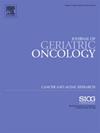A patient co-led project to set care and research priorities for older adults with cancer
IF 3
3区 医学
Q3 GERIATRICS & GERONTOLOGY
引用次数: 0
Abstract
Introduction
Older adults with cancer face unique challenges, including complex needs and systemic barriers to care. These factors affect their medical treatment decisions and overall quality of life, while caregivers face concurrent burdens. Building on a multi-phase, patient- and community-engaged project, this survey study aimed to validate and rank research and care priorities for older adults with cancer in British Columbia, Canada generated from our earlier work.
Materials and Methods
A cross-sectional survey was conducted with healthcare professionals, older adults with cancer, caregivers, and community members recruited from health and community organizations. Respondents completed a 19-item online survey with five open-ended questions. Respondents rated and ranked six care and six research priorities identified from our previous work. Quantitative analysis utilized descriptive statistics to assess the significance of priorities, while thematic analysis examined factors influencing respondents' prioritization and decision-making.
Results
Data from106 respondents were analyzed. Financial barriers (e.g., medication costs, transportation, housing) was identified as the top care priority, followed by continuity of care. The highest-ranked research priority was implementing geriatric assessment and co-management by interdisciplinary teams. Open-ended responses emphasized financial strain, the need for holistic and culturally competent care, and challenges older adults face navigating fragmented healthcare systems.
Discussion
This study highlights the need for integrated geriatric oncology services that address financial, cultural, and systemic barriers. These priorities provide a foundation for developing tailored interventions and policies to improve cancer care for older adults in Canada. Differences in rankings across groups have methodological implications for inclusive, patient and community-engaged research.
一个病人共同领导的项目,为患有癌症的老年人设定护理和研究重点
老年癌症患者面临着独特的挑战,包括复杂的需求和系统性的护理障碍。这些因素影响他们的医疗决定和整体生活质量,而护理人员面临着同时的负担。基于一个多阶段、患者和社区参与的项目,这项调查研究旨在验证和排名加拿大不列颠哥伦比亚省老年癌症患者的研究和护理优先级,这是我们早期工作的结果。材料和方法对医疗保健专业人员、老年癌症患者、护理人员和从卫生和社区组织招募的社区成员进行了横断面调查。受访者完成了一份包含19个项目和5个开放式问题的在线调查。受访者对我们以前工作中确定的六个护理和六个研究重点进行了评级和排名。定量分析利用描述性统计来评估优先事项的重要性,而专题分析则审查影响答复者确定优先事项和决策的因素。结果对106名被调查者的数据进行了分析。财务障碍(例如,药物费用、交通、住房)被确定为首要的护理重点,其次是护理的连续性。排名最高的研究重点是实施跨学科团队的老年评估和共同管理。开放式回答强调了经济压力,对整体和文化上合格的护理的需求,以及老年人在分散的医疗保健系统中面临的挑战。本研究强调了解决经济、文化和系统障碍的综合老年肿瘤学服务的需求。这些优先事项为制定有针对性的干预措施和政策提供了基础,以改善加拿大老年人的癌症护理。不同群体之间的排名差异对包容性、耐心和社区参与的研究具有方法学意义。
本文章由计算机程序翻译,如有差异,请以英文原文为准。
求助全文
约1分钟内获得全文
求助全文
来源期刊

Journal of geriatric oncology
ONCOLOGY-GERIATRICS & GERONTOLOGY
CiteScore
5.30
自引率
10.00%
发文量
379
审稿时长
80 days
期刊介绍:
The Journal of Geriatric Oncology is an international, multidisciplinary journal which is focused on advancing research in the treatment and survivorship issues of older adults with cancer, as well as literature relevant to education and policy development in geriatric oncology.
The journal welcomes the submission of manuscripts in the following categories:
• Original research articles
• Review articles
• Clinical trials
• Education and training articles
• Short communications
• Perspectives
• Meeting reports
• Letters to the Editor.
 求助内容:
求助内容: 应助结果提醒方式:
应助结果提醒方式:


